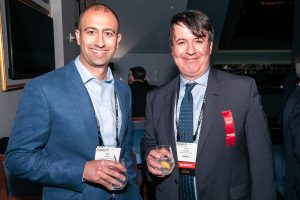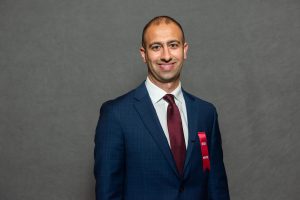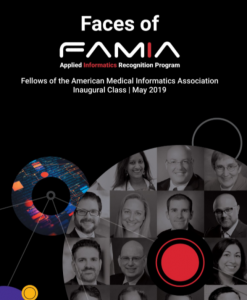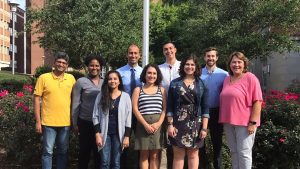On May 1st, Dr. Saif Khairat of the Carolina Health Informatics Program (CHIP) was inducted as a Fellow of the American Medical Informatics Association (FAIMA) held during the Clinical Informatics Conference in Atlanta, Georgia.
Dr. Khairat, who serves as an assistant professor in the School of Nursing at the University of North Carolina at Chapel Hill, was recognized for his expertise and knowledge in the areas of health information technology usability and visualization, and telemedicine in health services research. His work focuses on the usability of health information technologies in improving the link between clinicians and their patients, specifically through electronic medical records (EMRs) and telehealth systems. In recognizing informatics as being a significant tool in the delivery of healthcare, Dr. Khairat finds that the field of clinical informatics is an important area for research in order to improve patient outcomes and reduce costs associated with health care services and delivery.
Dr. Khairat credits his interests in clinical informatics and health care as being a result of a childhood spent around family members who worked in the hospital setting, stating that "I was always intrigued by the delivery and execution of
care. I grew up following my parents on rounds and roaming through wards, so I always had that passion to be in healthcare." More deeply, he describes a turning point in his life that squarely oriented him towards the field of clinical informatics, wherein he came up against a personal experience with the pitfalls of poor communication in health care delivery:
"A turning point in my life towards informatics was when my late grandfather was diagnosed with a terminal illness and he experienced a medical error before he passed away. That was the trigger. At that point I decided to pursue my PhD in informatics with a focus on ICU communication and medical errors. That error really hit home. Growing up, I did have interest, but at that point, I thought I really want to make a difference and hope I don’t have to see anyone else go through something like this again."
Since earning his PhD in Health Informatics from the University of Missouri, Dr. Saif has gone on to author close to 50 scientific articles in 20 different, peer-reviewed journals and conferences, and has served as an investigator for more than $2.5 million in research grants over the past 5 years. He also leads the Carolina Applied Informatics Research (CAIR) Group, a research team concentrating on electronic health record usability, teleconsent and telemedicine with the goal of improving the practice of medicine through innovation and technology. He also serves as the associate editor of the Applied Clinical Informatics (ACI) journal, and serves as scientific reviewer to various national and international journals and conferences.
Dr. Khairat's induction to FAMIA this month comes as a great milestone in his long and established association with the American Medical Informatics Association (AMIA). He first became a member in 2006 with the help of his then Master's advisor, Dr. Chi-Ren Shyu of the University of Missouri. When thinking about his association with AMIA, Dr. Khairat
states that "I feel like I’m a product of AMIA...I have had the pleasure of meeting, working with, and also being mentored by world renowned experts...I have a sense of strong belonging to AMIA. I’ve been a part of other professional organizations, but AMIA is the premier informatics association, for two main reasons: for its professionalism and its collaborative nature." Now, as a member of both the Working Group Steering Committee and Scientific Program Committee, and past Chair of the Education Working Group of AMIA, Dr. Khairat's fellowship represents another linkage in association with AMIA and an important personal achievement in what will undoubtedly be a long and fruitful career path. Dr. Khairat continues to be "eager to do more in the future."



